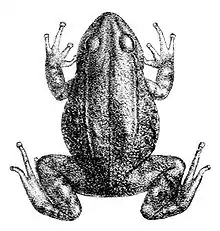Pristimantis curtipes
Pristimantis curtipes is a species of frog in the family Craugastoridae. It is found in the Nariño Department of southern Colombia and in the western and eastern Andes of Ecuador south to Desierto de Palmira (Chimborazo Province).[2][3][4]
| Pristimantis curtipes | |
|---|---|
 | |
| Scientific classification | |
| Kingdom: | Animalia |
| Phylum: | Chordata |
| Class: | Amphibia |
| Order: | Anura |
| Family: | Craugastoridae |
| Genus: | Pristimantis |
| Species: | P. curtipes |
| Binomial name | |
| Pristimantis curtipes (Boulenger, 1882) | |
| Synonyms | |
|
Eleutherodactylus curtipes (Boulenger, 1882) | |
Description
Pristimantis curtipes is a short-legged frog that shows large variation in adult size and colouration. Males measure 16–33 mm (0.63–1.30 in) and females 26–43 mm (1.0–1.7 in) in snout–vent length. Head is narrower than the body and wider than long. Tympanum is concealed. Dorsum bears low, flat warts and a pair of ill-defined dorsolateral folds. The colouration is highly variable but the ground color is usually dark gray or brown. Most specimens have indefinite darker mottling on the dorsum, striped in some individuals.[4][5]
Habitat
Pristimantis curtipes is a widely distributed and relatively common species.[1][5] Its altitudinal range is 2,750–4,400 m (9,020–14,440 ft) asl, probably extending higher. It is found primarily in páramo habitats[5] and, at lower end of its altitudinal range, in montane forests. When inactive, these frogs shelter under rocks on very humid grounds.[1] The altitudinal range overlaps with Pristimantis unistrigatus; in similar habitats at lower altitudes Pristimantis curtipes is replaced by the latter.[5]
Conservation
Pristimantis curtipes is an adaptable species that is under no significant threat, although habitat loss remains a potential threat. It is present in a number of national parks and reserves in Ecuador, including the Cotopaxi and Llanganates National Parks.[1]
References
- Castro, F.; Herrera, M.I.; Coloma, L.A.; Ron, S.; Lynch, J.; Almeida, D.; Nogales, F.; Almandáriz, A. & Yánez-Muñoz, M. (2004). "Pristimantis curtipes". IUCN Red List of Threatened Species. 2004: e.T56546A86451911. doi:10.2305/IUCN.UK.2004.RLTS.T56546A11495307.en.{{cite iucn}}: error: |doi= / |page= mismatch (help)
- Frost, Darrel R. (2014). "Pristimantis curtipes (Boulenger, 1882)". Amphibian Species of the World: an Online Reference. Version 6.0. American Museum of Natural History. Retrieved 16 March 2015.
- Acosta-Galvis, A.R. (2014). "Pristimantis curtipes (Boulenger, 1882)". Lista de los Anfibios de Colombia V.05.2015.0. www.batrachia.com. Retrieved 16 March 2015.
- Ortiz, DA; Coloma, LA; Vallejo, A; Frenkel, C (2013). "Hyloxalus bocagei". Frenkel, C., Guayasamín, J. M, Yánez-Muñoz, M. H., Varela-Jaramillo, A. & Ron, S. R. 2012. AmphibiaWebEcuador. Version 2014.0. Museo de Zoología, Pontificia Universidad Católica del Ecuador (QCAZ). Retrieved 16 March 2015.
- Lynch, J. D. (1981). "Leptodactylid frogs of the genus Eleutherodactylus in the Andes of northern Ecuador and adjacent Colombia". Miscellaneous Publication. Museum of Natural History, University of Kansas. 72: 1–46.
